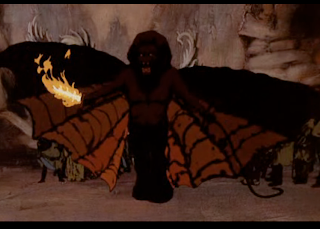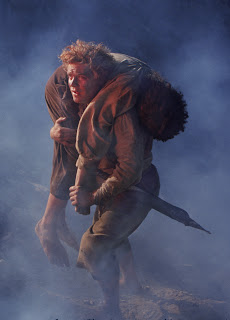Whatever the reason, in keeping with my never-ending quest to rip-off Cracked articles, I shall air all grievances l'esprit de listed crap:
1. "Not my Potter, you bitch!"
My theory is it comes down to quantity with so damn many of those people. To Rowling's credit, there's a wide-ranging appeal to this material. My mom likes Harry Potter for Christ's sake. But perhaps it's best to let this zealotry phase itself out. That Death Eater symbol's gonna look like a skull puking out a wiener after twenty years. So live it up, bra.
2. It's glorified Young Adult fiction.
I am by no means undermining J.K. Rowling's success. She's managed to craft a hugely successful fantasy franchise with memorable characters and moments. Not to mention Rowling's prose is considerably more accessible than someone like Tolkien's. And that's because Harry Potter is middle school fiction. Really, really great middle school fiction at that. The juvenile qualities of the series, especially in the first three, fade away as both Harry and the larger story arc matures. Hey, wait a minute...
On the other hand, there's absolutely nothing profound or literary about that Epilogue.
Rowling apparently had the ending planned out for years and (presumably) crafted the resolution of the story to match that endpoint. Drawing from my two semesters worth of creative writing experience which is clearly paying off in dividends, that strikes me as a very flawed system. The thing reads like a piece of fan fiction. I mean come on. "Albus Severus?" Yeeeesh. It's wish fulfillment at its most pungent.
Then again, J.K. Rowling is the one sitting on her silk-covered toilet, wiping her ass with rolls of crisp Franklins. So what do I know?
Nah. It's still pretty awful.
3. Harry Potter has all the womenses.
This isn't as shallow as it sounds. Off the top of your head, I'd bet twenty galleons you could name five females who've gone to a Potter screening at midnight. Now do that same exercise, except replace Potter with Star Trek. How many females went and saw Revenge of the Sith premiere? Thor? I'll take "Not Too Fucking Many" for 200, Alex.
Run a Google Image search on this. Not only will more females pop up on those Harry Potter results, but they'll likely be more attractive. Obviously this doesn't qualify the strength or weakness of anything, but it certainly doesn't hurt either.
I think I know why, too. Harry Potter does a better job of integrating the romance stuff. No, not that all women need requited love in their successful multi-billion dollar franchises, but for the more casual viewer, my maternal unit for example, it certainly helps.
Second -- and this is going to sound bad so I'll make things even worse by letting it hang for a while -- being a Harry Potter nerd doesn't require a great deal of commitment. Consider other areas of geekdom with extremely high numbers of female fans like Twilight or The Hunger Games. Maybe I'm trying too hard to make this work but the breadth of content is pretty limited in terms of any commitment. Harry Potter provides a geeky outlet for those people who don't have the time or patience for all the extra stuff. It's the toilet travel kit of pop culture franchises if you will. 'No, no. I don't want to hear about any Headmaster succession. I'll take my happy ending and be right on m'way.'
As promised, I'll qualify this more in a bit, but for now: THASS SEXISSS
Just to be clear, I'm not counting the throngs of half-models that weasel their way into Comic-Con every year with metal bikini outfits. Posers, I tell ye.
You disgust me.
4. The costumes suck.
Quality costume design does not concern how "sexy" you can alter something for a Halloween frat party, but this naivete has got to stop. It's time to admit there is absolutely nothing appealing about long black cloaks and pointy hats.
I will give the 'ole Warner Bros. execs their due credit for clearly realizing how fucking stupid those costumes would look on anyone over the age of 15. The last three promotional posters are proof:
Last time I checked, there wasn't a Hot Topic in Diagon Alley. What this costume business really boils down to is fans trying way too hard and still failing. The wizard cloak and hat thing isn't anywhere close to being as cool as Klingon armor or an ensign's Enterprise uniform.
But more to the point here, in the great equalizer of sex, the location of either of those Trek costumes is likely in the complete opposite direction of a boob.
But more to the point here, in the great equalizer of sex, the location of either of those Trek costumes is likely in the complete opposite direction of a boob.
5. Canon? What canon?
The central part of geekdom involves becoming ridiculously well-versed in a very specific subset of pop culture. Sports nerds don't just who know the Hartford Whalers were; they know the fucking jersey numbers of the 1993 roster. In other words, there's a real heft to obsession in geekdom. And Harry Potter doesn't fit the bill.
Like Twilight and or The Hunger Games, you can read all seven HP books (and maybe that fairy tale spin-off thing) and be done. Take a week's worth of sick leave, and you'll have mastered the Wonderful World of Hogwarts by Friday. It's worth noting that Suzanne Collins and Stephanie Meyer also write young adult fiction, too.
To better illustrate this, just look at how WB stretched out the last book as much as possible. Some might argue it was done for artistic reasons. I can see that. But eight films also lets you make a shit ton of money.
To be fair, Lucasfilm has been pulling this exact same stunt since 1997. The difference is that the Star Wars Universe doesn't stop there. After Luke, Leia, Han and their army of midget teddy bears defeat the Empire forever, there's a continual volley of poorly-written novels, video games, and one (soon to be two) television programs to follow. One might say it's a constantly expanding universe (ha!). Harry Potter fans have seven books. That's bush league.
Then we come to the topic of originality. J.K Rowling's infraction? Language, dear readers.
Let's take what will assuredly be the first of many, many theoretical linguistics tangents to come in future posts. The following is a list of selected curses and spells from Harry Potter:
Crucio
Descendo
Engorgio
Erecto
Flagrato
Reparo
Avada Kedavra
Now just taking a cursory glance at that -- excuse me, casting a cursorio charm on that list -- you can probably make a solid guess as to what most of them mean. "Crucio" inflicts severe pain for the receiver of the spell. Like a crucifixion, maybe? "Avada kedavra" kills you i.e. turns you into a ca-daver. See what she did there? Sadly, "erecto" is not what you're thinking. It's actually much more disappointing.
Those spells read like a failed Latin midterm, and they're just the examples I happened to choose. There be plenty more. Professor Remus Lupin turns into a werewolf (canis lupus is the Latin identification for wolf species). Sirius Black has the power to transform into a dog (and the star Sirius is nicknamed the "dog star").
In the interest of fairness, virtually every franchise suffers from something in this regard. George R.R. Martin has an infatuation with re-spelling common European first names. And let's not forget that "Darth Sidious" is about as shitty of an alias you can think of for a corrupt Senator to hide behind. Star Wars rips off Joseph Campbell and virtually every modern myth that loosely follows the hero cycle; Battlestar Galactica rips off Star Wars, etc. It's a horribly vicious circle of redundancy.
I am well aware that this could all be misconstrued as one giant lamentation about hipsterdom, but I think the honest form of geekery died around ten years ago. Or it was always just a pretentious way of living in the first place and the "original" geeks are just a bunch of closeted, self-righteous pricks.
That's enough ranting, Potter fans. Please resume all sexing and fun-having.
* * *

































